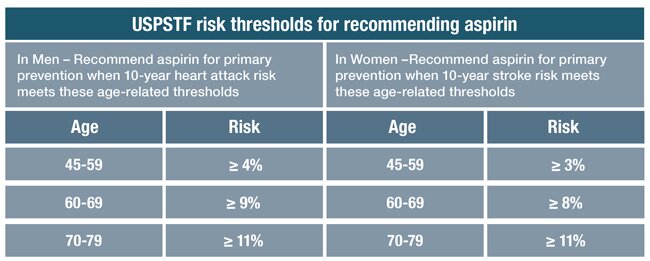Should I Prescribe Aspirin for Heart Disease?
If more healthy adults took daily low-dose aspirin, the number of strokes and heart attacks would be greatly reduced.2,6
In fact, 45,000 lives could be saved each year if 90% of U.S. adults at risk of heart disease took daily aspirin.11 This section of the website answers common questions about the U.S. Preventive Services Task Force (USPSTF) guidelines, providing information and resources to help you determine which patients should take low-dose daily aspirin to stay healthy as they age. Read Should I Prescribe Aspirin for Primary Prevention in my Patients? Fact Sheet (PDF) for more information.
The National Commission on Preventive Priorities identified “discussion of aspirin use with high-risk adults” as one of the highest value prevention services1×
What are the USPSTF key recommendations on aspirin for cardiovascular disease prevention? 2
The USPSTF recommends a 10-year cardiovascular risk assessment before prescribing aspirin and includes the following overall recommendations:
- Encourage aspirin use in men 45 to 79 years of age when the likely benefit of reduced heart attacks outweighs the increased chance of GI bleeding.
- Encourage aspirin use in women 55 to 79 years of age when the likely benefit of reduced ischemic strokes outweighs the increased chance of GI bleeding.
- Do not recommend aspirin for cardiovascular disease prevention in women younger than 55 years and in men younger than 45 years where the potential benefits of aspirin are too small to outweigh the harms.
- There is insufficient evidence to recommend aspirin for men and women 80 years or older.
How should I assess 10-year stroke risk in women?
Because aspirin has side effects, only recommend aspirin when aspirin’s benefits (based on 10-year risk) offset its potential harms. To calculate a woman’s 10-year stroke risk, the USPSTF recommends a stroke risk assessment.
What is the ideal method for assessing 10-year heart attack risk in men?
Because aspirin has side effects, only recommend aspirin when aspirin’s benefits (based on 10-year risk) offset its potential harms. To calculate a man’s 10-year heart attack risk, the USPSTF recommends a Framingham-style risk assessment.
I calculated my patient’s 10-year risk for heart attack or stroke. What do I do next?
The next step is to see whether your patient meets a sufficient risk threshold to warrant taking aspirin for prevention. Use the graphic below to find the risk threshold that applies to them based on their age and gender. Prescribe aspirin to patients where their calculated risk of stroke or heart attack exceeds these thresholds. For example, a 65-year-old woman with a calculated 10-year stroke risk of 10% has a stroke risk that exceeds the threshold of 8% and aspirin should be recommended.

This table accounts for the increased risk of bleeding with age.2,6 For patients with history of GI ulcers or who are taking NSAIDs regularly, bleeding risk is higher and these thresholds may not apply. NSAIDs (non-steroidal anti-inflammatory drugs) are pain medicines like ibuprofen, naproxen and celecoxib.
Should I prescribe aspirin to my elderly patients?
The USPSTF’s recommendations end at age 79 primarily because past clinical trials provide little information about older individuals.2 Regardless, experts believe that if prescribed with caution, low-dose aspirin may benefit those 80 and older and should be discussed if they are receptive to this intervention.
What are the most common side effects of low-dose aspirin?
The USPSTF risk thresholds increase with age because as people get older, their susceptibility to aspirin-induced bleeding increases. Be sure to consider NSAID use and history of GI ulcers as these further raise the risk of serious GI bleeding and should be considered in determining the balance of benefits and harms.3-6 Some people have additional risk factors for aspirin-induced bleeding that should also impact your decision to recommend daily aspirin.
Does aspirin prevent cancer and dementia?
Accumulating data show aspirin has benefits in the prevention of cancer and dementia.7-10 Future USPSTF guidelines may broaden the use of aspirin for prevention. For now, it is prudent to discuss aspirin's benefits and harms in patients who fall just short of eligibility based on cardiovascular disease benefits. This may include selected patients younger than the current minimum age recommendations (45 years for men and 55 for women).

